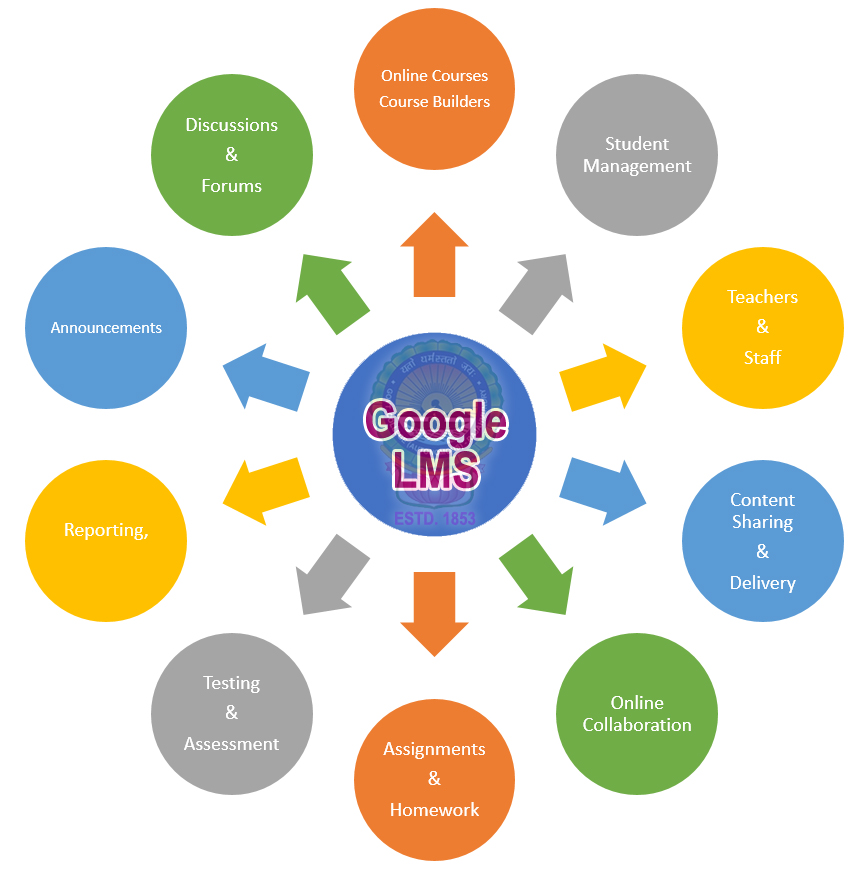Google LMS
Students and staff members of our college using Google Classroom. Google Classroom can be utilized as a free learning management system with the help of free Google Apps for Education account. Google Classroom is a web service developed by Google for educational institutes to simplify creating, distributing and grading assignments in a paperless way.It is a part of Google Apps for Education—is a free suite of productivity tools that includes email, documents, and storage. Classroom was designed collaboratively with teachers to help them save time, keep classes organized, and improve communication with students.
All the students and staff of the college provided domain specific email ids to access the Google LMS. It also includes Drive, Docs, Sheets, Slides, Sites, Calendar and other Google App services with complete control over the administrator.
Overview
Using Classroom

Click here for LMS Flow Diagram
Lecturer Capturing System
&
E-Content Development
Digital Recording Studio (Drusya)
Media Centre
As part of the IT initiative of the Government College (A), Rajamahendravaram was established Lecturer Capturing System (Digital Recording Studio (Drusya)) (Media Centre) for E-Content Development
The Centre facilitates the followings
- Recording Video lectures of the faculty members within and outside faculty members those who have professional teaching capabilities in their concerned subjects.
- Recording or capturing of various skills based foundation courses like Communication and Soft Skills with trained faculty and displayed them on our college website LMS Portal for repeated learning process.
Digital Classrooms
The digital classroom (also flipped classroom, blended learning and smart class room) refers to the "Technology-enabled" classroom where student learning and interaction with the instructor and peers is fully supported through strategic use of information and communication technologies (ICTs).
Smart Classroom Equipment is a solution designed to help teachers in meeting with new challenges and developing student's abilities and performance.
In our college, there are 3 three digital class rooms are available in all the three blocks. One in Arts Block Room No.31, one in Science Block Room No. 58 and another one is in PG Block Room No. 307.
Equipment available in DCs
|
S.No |
Description |
Number |
|
1 |
Smart TV 65 Inches |
1 |
|
2 |
Digital Podium |
1 |
|
3 |
CPU |
1 |
|
4 |
White Marker Board |
4 x 8 |
|
5 |
Laptop |
HP |
|
6 |
Speaker Sets |
2 |
|
7 |
Net dongles |
1 |
Virtual Classrooms
Virtual classroom is a teaching and learning environment where participants can interact, communicate, view and discuss presentations, and engage with learning resources while working in groups, all in an online setting.The medium is often through a video conferencing application that allows multiple users to be connected at the same time through the Internet, which allows users from virtually anywhere to participate.
In our college, there are 5 (FIVE) Virtual Class Rooms are available in two blocks. Two are in Arts Block Room No.7 and 27, Three in Science Block Room No. 85, 86, and 94 & 95.
Equipment available in VCs
|
S.No |
Description |
Number |
|
1 |
Screen Sharing LCD Projector |
1 |
|
2 |
Audio Speakers |
1 |
|
3 |
Computer System |
1 |
|
4 |
Block Board |
4 x 8 |
|
5 |
Mike caller |
HP |
|
6 |
Speaker Sets |
2 |
|
7 |
1O Mbps Leased Line Net connection |
1 |
|
8 |
Smart Camera |
1 |
|
9 |
Life size cloud software |
|
i-AMS
We have 20 biometric metric IoT based capturing machines to capture the attendance through facial recognization or thumb impression. All of them are fixed at walls of central library in Arts block. The attendance of Staff and Students directly connected to the CORE dashboard of Chief Minister of AP.Principal appointed a committee to monitor all activities concerned with i-AMS like Registration, Networking, complaints and daily monitoring etc.
Software Training through Spoken Tutorial
College Collaborated with IIT-B to offer Spoken Tutorial Training to the Students. It is made mandatory to all the students to complete atleast one Software Course from Spoken Tutorials. Certification will be given to the Students by IIT-B
NPTEL Database
NPTEL e-Resources are collected and Maintained in Local Server to provides access to the Students.
MHRD, Government of India
DIGITAL INITIATIVES FOR HIGHER EDUCATION
SWAYAM |
SWAYAM is a programme initiated by Government of India and designed to achieve the three cardinal principles of Education Policy viz., access, equity and quality. The objective of this effort is to take the best teaching learning resources to all, including the most disadvantaged. SWAYAM seeks to bridge the digital divide for students who have hitherto remained untouched by the digital revolution and have not been able to join the mainstream of the knowledge economy. For more information: Click Here |
|
SWAYAM Prabha DTH channels |
The SWAYAM PRABHA is a group of 32 DTH channels devoted to telecasting of high-quality educational programmes on 24X7 basis using the GSAT-15 satellite. Every day, there will be new content for at least (4) hours which would be repeated 5 more times in a day, allowing the students to choose the time of their convenience. The channels are uplinked from BISAG, Gandhinagar. The contents are provided by NPTEL, IITs, UGC, CEC, IGNOU, NCERT and NIOS. The INFLIBNET Centre maintains the web portal. For more information: Click Here |
National Digital Library |
Ministry of Human Resource Development under its National Mission on Education through Information and Communication Technology has initiated the National Digital Library of India (NDL India) pilot project to develop a framework of virtual repository of learning resources with a single-window search facility. Filtered and federated searching is employed to facilitate focused searching so that learners can find out the right resource with least effort and in minimum time. NDL India is designed to hold content of any language and provides interface support for leading Indian languages (currently Hindi and Bengali). The pilot project is devising a framework that is being scaled up with respect to content volume and diversity to serve all levels and disciplines of learners. It is being developed at IIT Kharagpur. For more information: Click Here |
|
National Academic Depository |
National Academic Depository (NAD) is an initiative of Government of India, facilitated by MHRD. NAD is a national database set up to hold academic awards issued by Academic Institutions (AI) in an electronic form. For more information: Click Here |
NPTEL India |
NPTEL is an acronym for National Programme on Technology Enhanced Learning which is an initiative by seven Indian Institutes of Technology (IIT Bombay, Delhi, Guwahati, Kanpur, Kharagpur, Madras and Roorkee) and Indian Institute of Science (IISc) for creating course contents in engineering and science. NPTEL as a project originated from many deliberations between IITs, Indian Institutes of Management (IIMs) and Carnegie Mellon University (CMU) during the years 1999-2003. A proposal was jointly put forward by five IITs (Bombay, Delhi, Kanpur, Kharagpur and Madras) and IISc for creating contents for 100 courses as web based supplements and 100 complete video courses, for forty hours of duration per course. For more information: Click Here |
e-shodhSindhu |
Based on the recommendation of an Expert Committee, the MHRD has formed e-ShodhSindhu merging three consortia initiatives, namely UGC-INFONET Digital Library Consortium, NLIST and INDEST-AICTE Consortium.The e-ShodhSindhu will continue to provide current as well as archival access to more than 15,000 core and peer-reviewed journals and a number of bibliographic, citation and factual databases in different disciplines from a large number of publishers and aggregators to its member institutions including centrally-funded technical institutions, universities and colleges that are covered under 12(B) and 2(f) Sections of the UGC Act. For more information: Click Here |
Global Initiative for Academic Network (GIAN) |
Global Initiative for Academic Network (GIAN) programme approved by Union Cabinet in Higher Education aimed at tapping the talent pool of Scientist and Entrepreneur Internationally to encourage their engagement with the institutes of higher Education in India so as to augment the country’s existing academic resources, accelerate the pace of quality reform, and elevate India’s scientific and technological capacity to global excellence. For more information: Click Here |
Spoken Tutorial |
IIT Bombay has been promoting use of open source software in educational institutions. The Spoken Tutorial Project is about teaching and learning a particular FOSS (Free and Open Source Software) like Linux, Scilab, LaTeX, PHP & MySQL, Java, C/C++, LibreOffice etc. via an easy Video tool - Spoken Tutorials. For more information: Click Here |
Virtual Labs |
Virtual Labs project is an initiative of Ministry of Human Resource Development (MHRD), Government of India under the aegis of National Mission on Education through Information and Communication Technology (NMEICT). This project is a consortium activity of twelve participating institutes and IIT Delhi is coordinating institute. It is a paradigm shift in ICT-based education. For the first time, such an initiative has been taken-up in remote‐experimentation. Under Virtual Labs project, over 100 Virtual Labs consisting of approximately 700+ web-enabled experiments were designed for remote-operation and viewing. For more information: Click Here |
N-LIST |
The Project entitled "National Library and Information Services Infrastructure for Scholarly Content (N-LIST)", being jointly executed by the e-ShodhSindhu Consortium, INFLIBNET Centre and the INDEST-AICTE Consortium, IIT Delhi provides for i) cross-subscription to e-resources subscribed by the two Consortia, i.e. subscription to INDEST-AICTE resources for universities and e-ShodhSindhu resources for technical institutions; and ii) access to selected e-resources to colleges. The N-LIST project provides access to e-resources to students, researchers and faculty from colleges and other beneficiary institutions through server(s) installed at the INFLIBNET Centre. The authorized users from colleges can now access e-resources and download articles required by them directly from the publisher's website once they are duly authenticated as authorized users through servers deployed at the INFLIBNET Centre. For more information: Click Here |
| For more information Click Here | |


